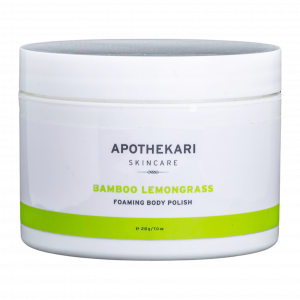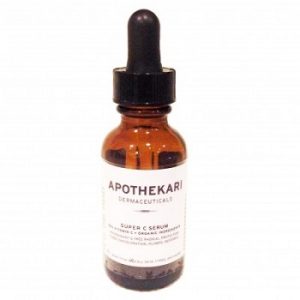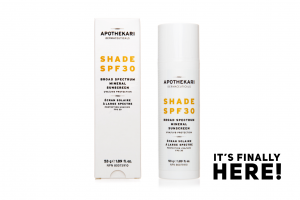Want to know why most skin care professionals recommend incorporating an antioxidant serum into your daily skin care regimen? This post explains exactly that.
Simply put, an antioxidant is a molecule that inhibits the oxidation of other molecules. Oxidation is a chemical reaction that can produce free radicals, harmful substances that we hear a lot about when it comes to skin. You may have also heard free radicals described as Reactive Oxygen Species – ROS, which is a term used to describe them in living organisms.
Free radicals hasten the aging process by contributing to chain reactions that ultimately may damage cells. Because they react with whatever is around, they can attack DNA, proteins and lipids, permanently changing their structure. When it comes to skin, the end result is damage, which we see as fine lines, wrinkles, hyperpigmentation and some types of skin cancer. Because free radicals also trigger inflammation, they have been associated with a breakdown of collagen, which leads to skin sag.
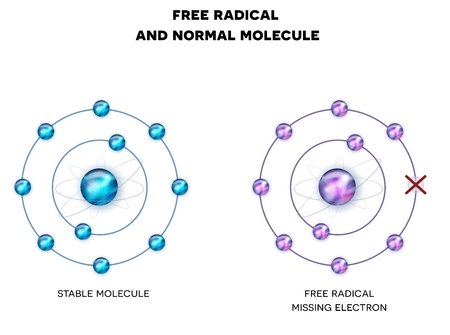 Unlike free radicals, antioxidants are stable molecules. They help by donating one of their electrons to a free radical, thereby stopping the chain reaction that causes damage. Fortunately, our bodies manufacture a number of important antioxidants to help combat free radical damage.
Unlike free radicals, antioxidants are stable molecules. They help by donating one of their electrons to a free radical, thereby stopping the chain reaction that causes damage. Fortunately, our bodies manufacture a number of important antioxidants to help combat free radical damage.
This includes glutathione and enzymes such as catalase and superoxide dismutase. The recommendation to eat (or in the case of your skin, to apply) antioxidants such as vitamin C, vitamin E and others is to help top up your body’s antioxidant store if too many free radicals are present. 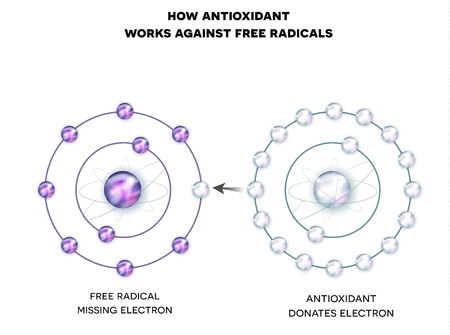 There is a lot of research to support the topical application of antioxidants, which have been shown to help protect skin from damage caused by UV rays, pollution and smoke. There isn’t one ‘miracle’ antioxidant and your skin benefits from a mix.
There is a lot of research to support the topical application of antioxidants, which have been shown to help protect skin from damage caused by UV rays, pollution and smoke. There isn’t one ‘miracle’ antioxidant and your skin benefits from a mix.
The following have good clinical studies to support their efficacy in skin care:
- Vitamin C. The L-ascorbic acid form is backed by the most science
- Vitamin E. Works in tandem with Vitamin C to protect skin
- Ferulic acid. Helps to boost the stability of vitamins C and E
- Green Tea Polyphenols – Epigallocatechin-3-gallate (EGCG) is thought to have 25-100 times more antioxidant ability as vitamins C and E. Green tea contains other polyphenols (epicatechin, epicathechin-3-gallate, epigallocatechin) with excellent antioxidant activity.
- Superoxide dismutase and catalase. Enzymes found naturally in our bodies.
- Resveratrol.
- Genistein. From soy.
- Lycopene
- Coenzyme Q10.
 This list is by no means exhaustive and as more research becomes available, it’s certain that we’ll discover additional antioxidants that can help skin. Our Bespoke Vitamin C Serum, available in both a 10% and 15% concentration, contains Vitamin C (as L-ascorbic acid), Vitamin E, green tea plus additional antioxidants in a light, hydrating formulation to protect, repair, brighten, exfoliate and more.
This list is by no means exhaustive and as more research becomes available, it’s certain that we’ll discover additional antioxidants that can help skin. Our Bespoke Vitamin C Serum, available in both a 10% and 15% concentration, contains Vitamin C (as L-ascorbic acid), Vitamin E, green tea plus additional antioxidants in a light, hydrating formulation to protect, repair, brighten, exfoliate and more.
Which Antioxidant Serum is Right For You?
As with any skin care product, your antioxidant serum must be formulated appropriately to ensure that it is stable, can penetrate your skin and contain a high enough concentration to do its job. This is where sticking with a reputable brand makes sense.
The following guidelines will help you to find one that works:
- To get the most bang for your buck, seek out ingredients that deliver more than just antioxidant protection. For example, Vitamin C not only protects against free radical damage, but also brightens skin tone and promotes collagen synthesis at higher concentrations.
- Opt for a product with a combination of ingredients, which usually performs better than just one single trendy ingredient.
- Apply antioxidants in the morning prior to UV exposure. UV rays are one of the biggest causes of free radicals.
Although this post discusses an antioxidant serum, there is no reason that you can’t swap the serum for a cream or lotion. A serum is just a delivery system for the ingredients inside so if you lean towards cream or lotion formulations, go with that.
Do you incorporate an antioxidant into your skin care routine?





